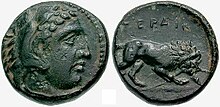
Back Perdikkas III van Masedonië Afrikaans بيرديكاس الثالث المقدوني Arabic بيرديكاس التالت المقدونى ARZ Пердика III Bulgarian ম্যাসিডনের তৃতীয় পেরদিক্কাস Bengali/Bangla Perdicas III Catalan Perdikkás III. Czech Perdikkas III. German Περδίκκας Γ΄ της Μακεδονίας Greek Pérdicas III de Macedonia Spanish
This article needs additional citations for verification. (September 2014) |
| Perdiccas III | |
|---|---|
 stater of Perdikkas III | |
| King of Macedonia | |
| Reign | 365–360 BC |
| Predecessor | Alexander II |
| Successor | Amyntas IV |
| Died | 360 BC |
| Issue | Amyntas IV |
| Dynasty | Argead dynasty |
| Father | Amyntas III |
| Mother | Eurydice I |
| Religion | Ancient Greek religion |

Perdiccas III (Greek: Περδίκκας Γ΄) was king of the Hellenistic kingdom of Macedonia from 365 BC to 360 BC,[1] succeeding his brother Alexander II.
Son of Amyntas III and Eurydice, he was a child when in 369 BC his brother Alexander II was killed by their brother-in-law Ptolemy of Aloros, who then ruled as regent. In 365 BC, Perdiccas killed Ptolemy and assumed government.[2]
There is very little information about the reign of Perdiccas III. He was at one time engaged in hostilities with Athens over Amphipolis, and he was distinguished for his patronage of men of letters. Among these we are told that Euphraeus of Oreus, a disciple of Plato, rose so high in Perdiccas's favour as to completely govern the young king and to exclude from his society all but philosophers and geometers.
He also served as theorodokos in the Panhellenic Games that took place in Epidaurus around 360/359 BC.[3]
In 360 BC, Perdiccas tried to reconquer upper Macedonia from the Illyrian Bardylis, but the expedition ended in disaster, with Perdiccas being killed.[4][5][6] Diodorus Siculus attests that four thousand men had died in the expedition, and that the remainder, panic-stricken, had become exceedingly afraid of the Illyrian armies and had lost heart for continuing the war.[7]
Perdiccas was succeeded by his infant son, Amyntas IV. The throne was soon usurped by Perdiccas's younger brother Philip II.
- ^ Cosmopoulos, Michael B. 1992. Macedonia: An Introduction to its Political History. Winnipeg: Manitoba Studies in Classical Civilization, p. 30 (TABLE 2: The Argeiad Kings).
- ^ Errington, Robert Malcolm (1990). A History of Macedonia. Berkeley: University of California Press. pp. 35–36. ISBN 9780520063198. Retrieved 24 August 2020.
- ^ Perlman, Paula. 2000. City and Sanctuary in Ancient Greece: The Theorodokia in the Peloponnese. Göttingen: Vandenhoeck & Ruprecht, pp. 38, 126
- ^ Flower, Michael A. (1997). Theopompus of Chios History and Rhetoric in the Fourth Century BC. Clarendon Press. p. 119. ISBN 978-0-19-815243-9.
- ^ Phillips, David (2004). Athenian Political Oratory Sixteen Key Speeches. Taylor & Francis. p. 36. ISBN 978-1-135-88860-2.
- ^ Orrieux, Claude. 1999. A History Of Ancient Greece. Wiley, p. 256, ISBN 0-631-20309-5.
- ^ Worthington, Ian; Roisman, Joseph (7 July 2011). A Companion to Ancient Macedonia. Wiley Blackwell. p. 289. ISBN 978-1-4443-5163-7.